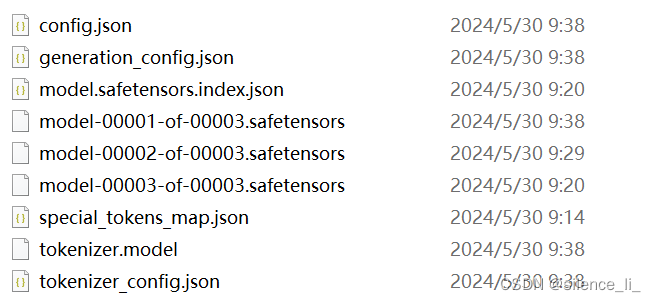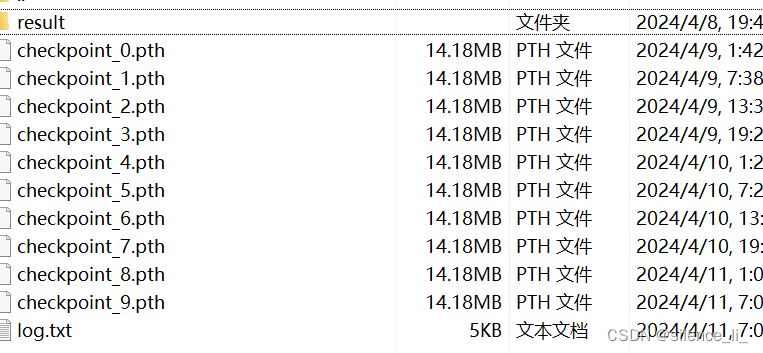本周我们计划开始对模型进行训练。
训练模型
使用 bash finetune_gnn.sh 命令开始训练,这里注意,配置文件train_configs/drugchat_stage2_finetune.yaml中有个地方是有问题的,model:ckpt:中不需要填写,把已填内容改为""即可。然后正常进行训练,训了大概10个epoch,保存每个epoch的训练点用于后期跑demo
下面是训练的配置:
"""
Copyright (c) 2022, salesforce.com, inc.
All rights reserved.
SPDX-License-Identifier: BSD-3-Clause
For full license text, see the LICENSE_Lavis file in the repo root or https://opensource.org/licenses/BSD-3-Clause
"""
import logging
import json
from typing import Dict
from omegaconf import OmegaConf
from pipeline.common.registry import registry
class Config:
def __init__(self, args):
self.config = {}
self.args = args
# Register the config and configuration for setup
registry.register("configuration", self)
user_config = self._build_opt_list(self.args.options)
config = OmegaConf.load(self.args.cfg_path)
runner_config = self.build_runner_config(config)
model_config = self.build_model_config(config, **user_config)
dataset_config = self.build_dataset_config(config)
# Validate the user-provided runner configuration
# model and dataset configuration are supposed to be validated by the respective classes
# [TODO] validate the model/dataset configuration
# self._validate_runner_config(runner_config)
# Override the default configuration with user options.
self.config = OmegaConf.merge(
runner_config, model_config, dataset_config, user_config
)
def _validate_runner_config(self, runner_config):
"""
This method validates the configuration, such that
1) all the user specified options are valid;
2) no type mismatches between the user specified options and the config.
"""
runner_config_validator = create_runner_config_validator()
runner_config_validator.validate(runner_config)
def _build_opt_list(self, opts):
opts_dot_list = self._convert_to_dot_list(opts)
return OmegaConf.from_dotlist(opts_dot_list)
@staticmethod
def build_model_config(config, **kwargs):
model = config.get("model", None)
assert model is not None, "Missing model configuration file."
model_cls = registry.get_model_class(model.arch)
assert model_cls is not None, f"Model '{model.arch}' has not been registered."
model_type = kwargs.get("model.model_type", None)
if not model_type:
model_type = model.get("model_type", None)
# else use the model type selected by user.
assert model_type is not None, "Missing model_type."
model_config_path = model_cls.default_config_path(model_type=model_type)
model_config = OmegaConf.create()
# hierarchy override, customized config > default config
model_config = OmegaConf.merge(
model_config,
OmegaConf.load(model_config_path),
{"model": config["model"]},
)
return model_config
@staticmethod
def build_runner_config(config):
return {"run": config.run}
@staticmethod
def build_dataset_config(config):
datasets = config.get("datasets", None)
if datasets is None:
raise KeyError(
"Expecting 'datasets' as the root key for dataset configuration."
)
dataset_config = OmegaConf.create()
for dataset_name in datasets:
builder_cls = registry.get_builder_class(dataset_name)
dataset_config_type = datasets[dataset_name].get("type", "default")
dataset_config_path = builder_cls.default_config_path(
type=dataset_config_type
)
# hierarchy override, customized config > default config
dataset_config = OmegaConf.merge(
dataset_config,
OmegaConf.load(dataset_config_path),
{"datasets": {dataset_name: config["datasets"][dataset_name]}},
)
return dataset_config
def _convert_to_dot_list(self, opts):
if opts is None:
opts = []
if len(opts) == 0:
return opts
has_equal = opts[0].find("=") != -1
if has_equal:
return opts
return [(opt + "=" + value) for opt, value in zip(opts[0::2], opts[1::2])]
def get_config(self):
return self.config
@property
def run_cfg(self):
return self.config.run
@property
def datasets_cfg(self):
return self.config.datasets
@property
def model_cfg(self):
return self.config.model
def pretty_print(self):
logging.info("\n===== Running Parameters =====")
logging.info(self._convert_node_to_json(self.config.run))
logging.info("\n====== Dataset Attributes ======")
datasets = self.config.datasets
for dataset in datasets:
if dataset in self.config.datasets:
logging.info(f"\n======== {dataset} =======")
dataset_config = self.config.datasets[dataset]
logging.info(self._convert_node_to_json(dataset_config))
else:
logging.warning(f"No dataset named '{dataset}' in config. Skipping")
logging.info(f"\n====== Model Attributes ======")
logging.info(self._convert_node_to_json(self.config.model))
def _convert_node_to_json(self, node):
container = OmegaConf.to_container(node, resolve=True)
return json.dumps(container, indent=4, sort_keys=True)
def to_dict(self):
return OmegaConf.to_container(self.config)
def node_to_dict(node):
return OmegaConf.to_container(node)
class ConfigValidator:
"""
This is a preliminary implementation to centralize and validate the configuration.
May be altered in the future.
A helper class to validate configurations from yaml file.
This serves the following purposes:
1. Ensure all the options in the yaml are defined, raise error if not.
2. when type mismatches are found, the validator will raise an error.
3. a central place to store and display helpful messages for supported configurations.
"""
class _Argument:
def __init__(self, name, choices=None, type=None, help=None):
self.name = name
self.val = None
self.choices = choices
self.type = type
self.help = help
def __str__(self):
s = f"{self.name}={self.val}"
if self.type is not None:
s += f", ({self.type})"
if self.choices is not None:
s += f", choices: {self.choices}"
if self.help is not None:
s += f", ({self.help})"
return s
def __init__(self, description):
self.description = description
self.arguments = dict()
self.parsed_args = None
def __getitem__(self, key):
assert self.parsed_args is not None, "No arguments parsed yet."
return self.parsed_args[key]
def __str__(self) -> str:
return self.format_help()
def add_argument(self, *args, **kwargs):
"""
Assume the first argument is the name of the argument.
"""
self.arguments[args[0]] = self._Argument(*args, **kwargs)
def validate(self, config=None):
"""
Convert yaml config (dict-like) to list, required by argparse.
"""
for k, v in config.items():
assert (
k in self.arguments
), f"""{k} is not a valid argument. Support arguments are {self.format_arguments()}."""
if self.arguments[k].type is not None:
try:
self.arguments[k].val = self.arguments[k].type(v)
except ValueError:
raise ValueError(f"{k} is not a valid {self.arguments[k].type}.")
if self.arguments[k].choices is not None:
assert (
v in self.arguments[k].choices
), f"""{k} must be one of {self.arguments[k].choices}."""
return config
def format_arguments(self):
return str([f"{k}" for k in sorted(self.arguments.keys())])
def format_help(self):
# description + key-value pair string for each argument
help_msg = str(self.description)
return help_msg + ", available arguments: " + self.format_arguments()
def print_help(self):
# display help message
print(self.format_help())
def create_runner_config_validator():
validator = ConfigValidator(description="Runner configurations")
validator.add_argument(
"runner",
type=str,
choices=["runner_base", "runner_iter"],
help="""Runner to use. The "runner_base" uses epoch-based training while iter-based
runner runs based on iters. Default: runner_base""",
)
# add argumetns for training dataset ratios
validator.add_argument(
"train_dataset_ratios",
type=Dict[str, float],
help="""Ratios of training dataset. This is used in iteration-based runner.
Do not support for epoch-based runner because how to define an epoch becomes tricky.
Default: None""",
)
validator.add_argument(
"max_iters",
type=float,
help="Maximum number of iterations to run.",
)
validator.add_argument(
"max_epoch",
type=int,
help="Maximum number of epochs to run.",
)
# add arguments for iters_per_inner_epoch
validator.add_argument(
"iters_per_inner_epoch",
type=float,
help="Number of iterations per inner epoch. This is required when runner is runner_iter.",
)
lr_scheds_choices = registry.list_lr_schedulers()
validator.add_argument(
"lr_sched",
type=str,
choices=lr_scheds_choices,
help="Learning rate scheduler to use, from {}".format(lr_scheds_choices),
)
task_choices = registry.list_tasks()
validator.add_argument(
"task",
type=str,
choices=task_choices,
help="Task to use, from {}".format(task_choices),
)
# add arguments for init_lr
validator.add_argument(
"init_lr",
type=float,
help="Initial learning rate. This will be the learning rate after warmup and before decay.",
)
# add arguments for min_lr
validator.add_argument(
"min_lr",
type=float,
help="Minimum learning rate (after decay).",
)
# add arguments for warmup_lr
validator.add_argument(
"warmup_lr",
type=float,
help="Starting learning rate for warmup.",
)
# add arguments for learning rate decay rate
validator.add_argument(
"lr_decay_rate",
type=float,
help="Learning rate decay rate. Required if using a decaying learning rate scheduler.",
)
# add arguments for weight decay
validator.add_argument(
"weight_decay",
type=float,
help="Weight decay rate.",
)
# add arguments for training batch size
validator.add_argument(
"batch_size_train",
type=int,
help="Training batch size.",
)
# add arguments for evaluation batch size
validator.add_argument(
"batch_size_eval",
type=int,
help="Evaluation batch size, including validation and testing.",
)
# add arguments for number of workers for data loading
validator.add_argument(
"num_workers",
help="Number of workers for data loading.",
)
# add arguments for warm up steps
validator.add_argument(
"warmup_steps",
type=int,
help="Number of warmup steps. Required if a warmup schedule is used.",
)
# add arguments for random seed
validator.add_argument(
"seed",
type=int,
help="Random seed.",
)
# add arguments for output directory
validator.add_argument(
"output_dir",
type=str,
help="Output directory to save checkpoints and logs.",
)
# add arguments for whether only use evaluation
validator.add_argument(
"evaluate",
help="Whether to only evaluate the model. If true, training will not be performed.",
)
# add arguments for splits used for training, e.g. ["train", "val"]
validator.add_argument(
"train_splits",
type=list,
help="Splits to use for training.",
)
# add arguments for splits used for validation, e.g. ["val"]
validator.add_argument(
"valid_splits",
type=list,
help="Splits to use for validation. If not provided, will skip the validation.",
)
# add arguments for splits used for testing, e.g. ["test"]
validator.add_argument(
"test_splits",
type=list,
help="Splits to use for testing. If not provided, will skip the testing.",
)
# add arguments for accumulating gradient for iterations
validator.add_argument(
"accum_grad_iters",
type=int,
help="Number of iterations to accumulate gradient for.",
)
# ====== distributed training ======
validator.add_argument(
"device",
type=str,
choices=["cpu", "cuda"],
help="Device to use. Support 'cuda' or 'cpu' as for now.",
)
validator.add_argument(
"world_size",
type=int,
help="Number of processes participating in the job.",
)
validator.add_argument("dist_url", type=str)
validator.add_argument("distributed", type=bool)
# add arguments to opt using distributed sampler during evaluation or not
validator.add_argument(
"use_dist_eval_sampler",
type=bool,
help="Whether to use distributed sampler during evaluation or not.",
)
# ====== task specific ======
# generation task specific arguments
# add arguments for maximal length of text output
validator.add_argument(
"max_len",
type=int,
help="Maximal length of text output.",
)
# add arguments for minimal length of text output
validator.add_argument(
"min_len",
type=int,
help="Minimal length of text output.",
)
# add arguments number of beams
validator.add_argument(
"num_beams",
type=int,
help="Number of beams used for beam search.",
)
# vqa task specific arguments
# add arguments for number of answer candidates
validator.add_argument(
"num_ans_candidates",
type=int,
help="""For ALBEF and BLIP, these models first rank answers according to likelihood to select answer candidates.""",
)
# add arguments for inference method
validator.add_argument(
"inference_method",
type=str,
choices=["genearte", "rank"],
help="""Inference method to use for question answering. If rank, requires a answer list.""",
)
# ====== model specific ======
validator.add_argument(
"k_test",
type=int,
help="Number of top k most similar samples from ITC/VTC selection to be tested.",
)
return validator
获取vicuna
受到版权限制,LLaMA不提供最终的权重weight,非常考验从网上获取知识的能力(真的是服了啊),只提供delta版的权重(真实权重与获取到的权重的差值),所以需要自己获取vicuna的权重。
多方寻找寻找到了7b的权重参数,转换成抱抱脸格式的hf文件后,进行参数权重转化,得到如下图所示的权重:

把权重加到模型里面,开始训练
训练
训练得到多个记录点(用实验室的3090的一张卡跑的,非常慢非常慢非常慢,完整跑完10个epoch用了四天时间,前期还出现各种各样的bug,硬控10天左右)


选择精度还不错的checkpoint作为最后的模型
此时我们就准备好了模型参数,可以开始制作demo进行测试了






















 205
205

 被折叠的 条评论
为什么被折叠?
被折叠的 条评论
为什么被折叠?








